Maud was restless. She wanted to be alone. There were always so many people around her at the castle.
When she was a girl, she was happiest when she played alone in the gardens behind the old house. And when her parents died and she had to go live at the abbey, she still sought refuge in the gardens. She loved to go into the old and forgotten places, the wild places where the flowers had been left to find their own ways. It was not the wilderness, for these were planted by men, but nor was it the prosaic, domestic world of purslane and parsnips and neat rows. And, most importantly, there she could be alone.
But there were no gardens in Lothere. There were the kitchen gardens, but no one here had ever heard of flowers, it seemed. Only poor Elfleda Wodehead had planted anything that did not have a medicinal or culinary purpose. And they called her mad.
Sigefrith had never dreamed of making a garden. Every scrap of land was given over to some practical purpose as soon as it was cleared. Even the dear trees around the castle were being cut down to build palisades just behind the moat. And Sigefrith would clap his hands in satisfaction and declare: “Here’s the first sunlight to hit this patch of earth in a hundred years!” Oh, he thought he was bringing light to the world, did he?
The castle hill was being turned into a naked hump of weeds and mud and new outbuildings that reeked of fresh wood. And there were more people living there every day: smiths and armorers and tanners – the warcrafters. How she hated them!
And there was no where for her to go. She spent her days with her children, but as much as she loved her children, there were times when she just needed to be alone. She longed to let down her hair, and put on a soft, green dress, and run out into the gardens – only there were no gardens.
And so Maud went out stalking in her proudest dress into the market square.
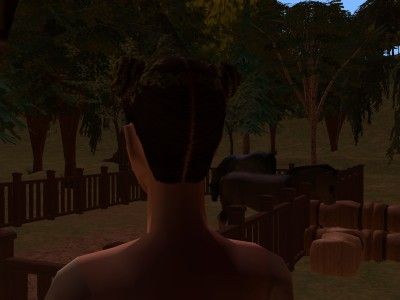
The market was over and the farmers had packed up and gone home. The place felt empty, as normally bustling places do when they are quiet, and that was precisely what she needed. And Sigefrith would never think to send a servant here for her.
Maud was smiling at a donkey who had hung his head over the fence and was lazily chomping at a bale of hay that a foolish farmer had left too close by. He knew he had all the time in the world. No one would come to bother him before morning.
She turned her head when she heard a few words of Gaelic coming from far off. She knew that cat-like walk: it was Malcolm, and he was laughing at the donkey too.

Maud flushed. It was Malcolm – he was everywhere and nowhere these past weeks. She saw him every day at the castle, but either from afar or, worse, from across the table at dinner. He would look up and catch her eye and smile at her with his smile that was as sharp as the dagger he always wore, and she would look away and swear he would never catch her looking at him again. A thousand times a night.
But she hadn’t been alone with him since that first morning. When he had touched her arm.
“What did you say to him?” she asked as he strolled up to her.
“I called him a fat, lazy b – boy whose dam may no have been married to his sire.” He winked.

“I hope you have no come to buy him?” he asked.
“Oh,” she said lightly, “I simply needed some air. It’s so busy at the castle.”
“So I find it. But the days are getting shorter, and you see the sun is setting. You will no like to walk home in the dark.”
She shrugged in annoyance.

“Then I won’t see it set, will I?”
“Do you like to?”
She nodded. “The only windows facing west at the castle are in the hall, and Sigefrith is always – ” She stopped herself. She couldn’t talk about Sigefrith with Malcolm.
“The hall is always full of people in the evening. I know it. And there is always music, and the people never dance. You barbarians don’t know how to live.”
“Do your people dance?”
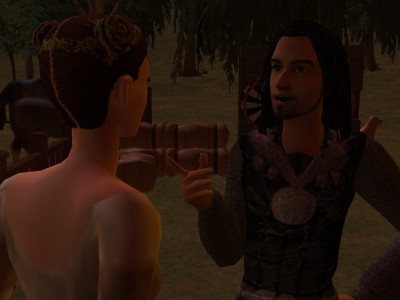
“It’s all we ever do – when we aren’t raiding and pillaging,” he laughed.
“You’re not as bad as they say.”
“We aren’t, but I am. Worse than they say, even.” He winked at her. “Be forewarned.”
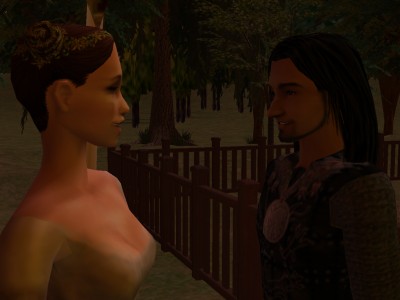
Maud blushed.
“Now, Your Majesty, look up at that sun. You wanted to see it set: it’s setting. Let’s watch it go. But next time, allow me to choose the place. There are nicer spots than here.”
Maud looked up at the sun and hoped its ruddy light hid the embarrassment flaming on her cheeks. Malcolm stepped away from her and leaned against the fence, but from where she stood she could not tell whether he was looking at her or looking at the sun – and she would not turn to see.
The sun set quickly behind the hills, but its red light lingered a long time at the horizon. Maud was too afraid to move. When should she decide it was over? Would he not speak?
Like a cat, he crept up behind her without a sound.
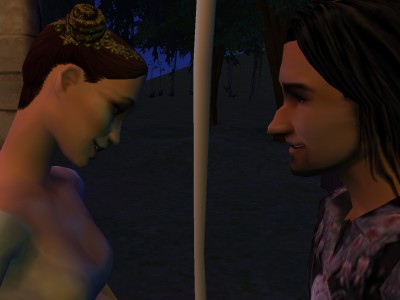
“Delightful, wasn’t it?” he asked softly. There was that word again. It seemed he liked to use it in dinner conversations he thought she might overhear – for he always looked up at her when he did.
“I – yes, it was.” In truth, she hadn’t noticed.
“Next time we go to the downs. There’s a fine hill there, and a fine white stone for sitting.”
Next time? How could there be a next time? “I think you presume too much,” she said, trying to keep her voice cold.
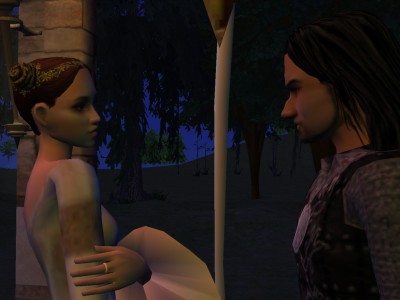
“Forgive me, then, and forget it. I had thought you were the sort of person who could love a wild place.”

She looked down, annoyed. What did he know about what she could love? Perhaps she simply didn’t want to go to such a place with him.
He said something then in Gaelic – he sounded annoyed too. But when she looked back at him she saw that he was looking over her shoulder.

It was old Alwy Hogge. He was babbling excitedly, obviously pleased to see Malcolm. Always talking about “his friend Egelric.”

Maud was so terribly weary of hearing about Egelric, seeing Egelric, dining with Egelric. She could not find anything so remarkable about the man, except that he had bewitched half the nobles in the valley – and this simpleminded peasant as well.
“Good evening,” she said abruptly, interrupting Alwy in mid-babble, and stalked off without a backward glance.









She really is a snob, isn't she?